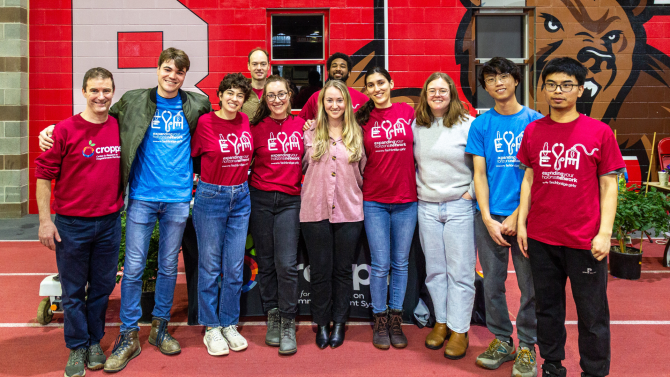
CROPPS team members showcase plant science insights with participants from the Expanding Your Horizons conference on April 5 at Barton Hall.
News directly from Cornell's colleges and centers
How do plants communicate? Students learn the science behind smart agriculture
By Matt Hayes
From drones that monitor crop health to plants that send text messages, middle and high school students at Cornell’s Expanding Your Horizons (EYH) conference experienced firsthand how plant science and technology are shaping the future of agriculture.
During the day-long STEM event on April 5 at Barton Hall, organized to spark scientific imagination in the next generation, the Center for Research on Programmable Plant Systems (CROPPS) hosted three hands-on stations where students explored plant sensing, environmental monitoring and responsive plant systems. Excited middle and high school students learned how researchers use remote sensing to track plant health, examined leaves through simple imaging techniques and saw a working prototype that translates a plant’s stress response into a text message.
“It was crazy—like, plants that can talk and tell you how they’re feeling,” said Gabriel Cage, an eighth grader from the Syracuse area. “With the way the weather is changing, that’s something we might need. It’s really cool and could help everyone in the future.”
“It was really cool to see how plants can interact with people and show stress—I didn’t even know that was possible,” said Clara Guidarelli, a seventh grader from the Albany area. “I never thought engineering and plant science could work together to solve such big problems. It’s inspiring to see how people started without knowing what they wanted to do and ended up working on something that could help the world.”
EYH is organized by graduate student volunteers across Cornell to stimulate interest in math and science through hands-on activities, provide scientist role models and foster awareness of opportunities in STEM careers. Participants attend workshops organized by Cornell faculty and students, tour state-of-the-art labs and connect with peers and mentors — all in an effort to show that anyone with a curious mind has what it takes to pursue a future in science and engineering.
As part of EYH, CROPPS trainee and doctoral student in plant biology Michelle Heeney hosted a workshop on biologically inspired engineering using plants with the lab of Adrienne Roeder, professor at the the Weill Institute for Cell and Molecular Biology and the Section of Plant Biology in the School of Integrative Plant Science. The workshop also tackled a common but often overlooked issue in science education: plant blindness—the tendency to overlook plants in our environment and underestimate their importance.
“When we teach students to see the patterns in plants and draw on them for inspiration, we’re not just curing plant blindness—we’re inviting them to open a lifelong dialogue with the natural world surrounding them,” Heeney said.
CROPPS trainees at EYH included graduate students from a range of fields at Cornell: Michelle Heeney and Andrea Sanchez Pinochet from plant biology; Erin Farmer and Sam Mosher from plant breeding and genetics; Jacob Belding from engineering; and postdoctoral associates Vesna Bacheva and Noor Mohammed AlBader. The group also included CROPPS alumna Gillian Gomer, undergraduate students Gabriel Leung and Braddy Maria, CROPPS director Abe Stroock, and Public Engagement Specialist Anya Gruber.
“We’re passionate about showing students that plants are not passive—they’re responsive, dynamic and full of stories waiting to be uncovered,” said Gruber. “EYH was a perfect space to share our excitement about programmable plant systems and help young people see that they can be scientists too.”
From programmable plants to precision sensing, the event underscored CROPPS’ mission to connect science with society—and to spark scientific imagination in the next generation.
Related
Media Contact
Get Cornell news delivered right to your inbox.
Subscribe